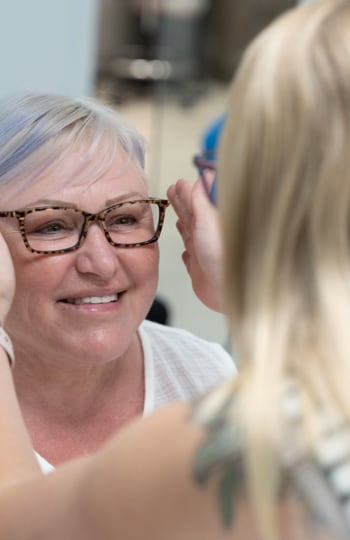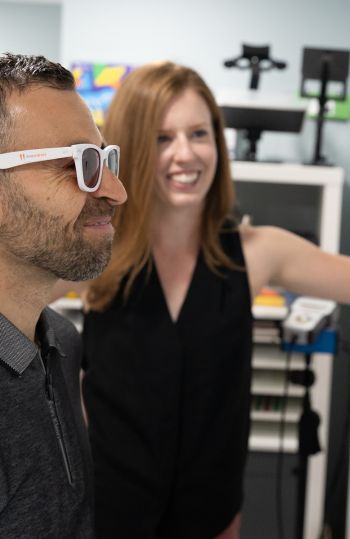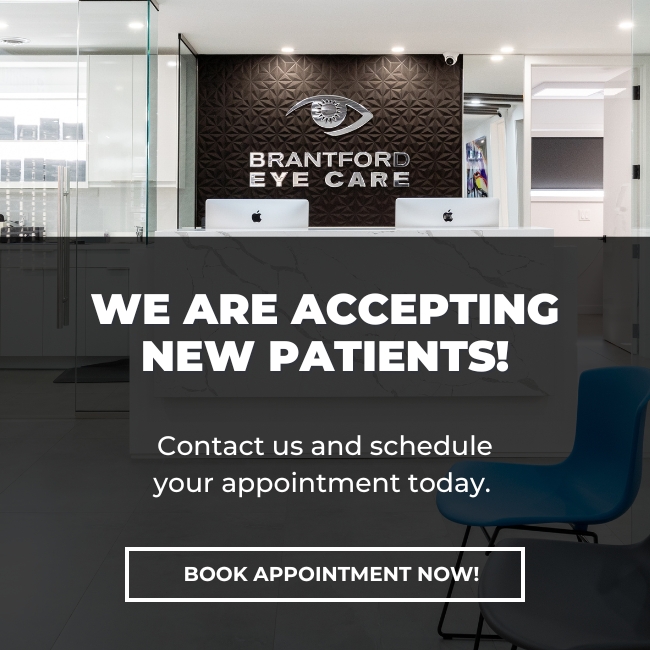
Include Your Eyes in Preventative Healthcare
Eye exams are a critical component of preventative healthcare. While getting an eye exam is important for ensuring you can see well and your eyewear prescription is up to date, they are also important for assessing the health of your eyes.
Many eye diseases progress without any noticeable symptoms, especially in their earliest stages. At Brantford Eye Care, we provide comprehensive eye examinations to detect and diagnose the beginnings of eye diseases.
We also offer MacuMira treatments for dry age-related macular degeneration, a Health Canada-approved treatment that can make a significant difference in your visual health.
Your sight is precious and timely identification of eye diseases is necessary to prevent vision loss. Book your eye exam today.



Diabetic Eye Diseases
Diabetic eye diseases like retinopathy can lead to vision loss and even blindness. Like many eye diseases, there may be little or no symptoms in its early stages.
Read more about diabetic eye diseases on our Diabetic Eye Exams page.

Glaucoma
Glaucoma is a group of eye diseases characterized by damage to the optic nerve, generally as a result of high intraocular pressure.
Types of Glaucoma
There are several different types of glaucoma:
- Open-Angle Glaucoma: The eye’s drainage channels become blocked, causing fluid buildup and a resulting increase in intraocular pressure (IOP).
- Angle-Closure Glaucoma: The narrowing of the space between the iris and cornea causes fluid to become trapped in the eye, raising intraocular pressure.
- Secondary Glaucoma: Intraocular pressure increases as a result of eye trauma, injury, or infection.
- Normal-Tension Glaucoma: Damage to the optic nerve occurs even though intraocular pressure remains within normal range.
Risk Factors for Glaucoma
People over the age of 60 are at an increased risk of developing glaucoma. Some of the other risk factors for the disease include:
- Family history
- Previous trauma to the eye
- High myopia
- Use of corticosteroids
- Diabetes
Testing for Glaucoma
At Brantford Eye Care, we have invested in diagnostic tools to detect glaucoma in its early stages. We use the Icare Tonometer as well as the Perkins Tonometer to assess the internal pressure of the eye.
Tonometry measures the force required to compress the cornea in a given area. Higher than normal IOP may alert us to the presence of glaucoma.
We also use an OCT (optical coherence tomographer), which helps us with early intervention.
Treating Glaucoma
There are medications available aimed at reducing intraocular pressure. If your case is more advanced, we may recommend surgery.
In the case of open-angle glaucoma, laser trabeculoplasty is a possible surgical intervention. A small laser opens clogged drains in your eye, relieving intraocular pressure. Trabeculectomies are also an option when a new drainage hole must be opened in the eye.

Cataracts
When the clear lens in your eye hardens and becomes opaque, this is the formation of a cataract. While cataracts are often the result of the normal aging process, they can appear in younger patients as well.
Maintaining good health as you age can help to prevent cataracts. If you do develop the condition, you can slow its progression by wearing sunglasses and keeping away from UV rays. A nutritious diet, rich in antioxidants can also help to prevent the formation of cataracts.
Cataracts generally develop without pain or redness.
Risk Factors for Cataracts
Age is the largest risk factor for cataracts. Almost everyone will develop cataracts at some point in their lives. Heredity also plays a role. If your parents developed cataracts at a young age, there is a chance you will too.
Symptoms of Cataracts
Symptoms of cataracts might include:
- Foggy vision
- Blurred vision
- Halos around lights
- Dull colour vision
- Light sensitivity
Treating Cataracts
Vision loss due to cataracts can be mitigated through the use of corrective lenses. If the condition is impacting your quality of life or your vision is still lacking, even with the use of contacts or glasses, surgery may be an option.
Cataract surgery is safe and effective and relatively common. The team at Brantford Eye Care will walk you through the process and ensure you understand the procedure.
Age-Related Macular Degeneration
Age-related macular degeneration (AMD) impacts your central vision by causing damage to the macula.
Your central vision is responsible for clear, crisp vision at close range. Reading, writing, driving, and recognizing faces can be challenging when there is central vision loss.
Types of AMD
Dry AMD
When parts of the macula gradually degrade, this is known as Dry AMD. It is the most common type of the disease.
Wet AMD
A less common type of the disease, Wet AMD is responsible for the majority of cases of blindness as a result of AMD. Wet AMD accounts for approximately 10% of AMD cases.
This type of AMD occurs when blood vessels grow under the retina, burst, and leak fluid into the macula.
Risk Factors for AMD
The following behaviours and conditions increase your risk of developing AMD:
- Smoking
- High blood pressure
- Extensive UV exposure
- Heredity
Symptoms of AMD
People with AMD may not experience any pain or symptoms in the earliest stages of the disease. But, you should be on the lookout for the following symptoms and get an eye exam right away if you notice them:
- Straight lines appearing wavy
- Blurring of the central vision
- Dark spots in central vision
MacuMira for AMD Treatment
MacuMira is Canada’s first clinically proven, Health Canada approved, noninvasive treatment for dry AMD. Using a patented waveform, MacuMira restores cellular function and clears harmful waste. With just 4 30-minute sessions, many experience visual improvement, followed by easy maintenance appointments.
Dry AMD can make everyday activities like reading, driving, and recognizing faces challenging. Many patients see quick results, often within the first 10 days, and experience improvements in vision clarity and contrast sensitivity.
Eager to learn more? Here are some great resources:
We’ll Be Your Eyes
At Brantford Eye Care, we take pride in our knowledge of eye disease diagnosis and management. During your comprehensive exams, we will be on the lookout for any signs you may be developing an eye disease.
Let us be your eyes when it comes to watching for eye diseases. Book your appointment today!

Our Locations
Brantford
- 268 Brant Ave.
- Brantford, ON N3T 3J7
*We’re closed on Saturdays during long weekends, as well as every Saturday in July & August.
Hours Of Operation
- Monday: 9:00 AM – 8:00 PM
- Tuesday: 9:00 AM – 8:00 PM
- Wednesday: 9:00 AM – 5:00 PM
- Thursday: 10:00 AM – 8:00 PM
- Friday: 9:00 AM – 5:00 PM
- Saturday: 9:00 AM – 4:00 PM*
- Sunday: Closed
Ohsweken
- 1721 Chiefswood Rd, Unit 13
- Ohsweken, ON N0A 1M0
Call us Mondays and Wednesdays between 9:00 am-4:00 pm (We are closed 1:00 pm – 1:30 pm). Please call the Brantford location on other days of the week.
Hours Of Operation
- Monday: 9:30 AM – 4:15 PM
- Wednesday: 9:30 AM – 4:15 PM

Our Blog
What Diseases Can Be Detected in an Eye Exam?
Eye ExamYour eyes can reveal far more than vision changes. During a comprehensive eye exam, your optometrist can detect early signs of serious health conditions—often before symptoms appear elsewhere in the body. At Brantford Eye Care, advanced diagnostic technology allows us to assess both your vision and your overall health in a single, thorough examination. A […]
Chalazion & Dry Eye: How Jett Plasma Pen Can Help
Eye ConditionsAn unexpected bump on your eyelid can be concerning. It might feel a little tender or just be an annoyance you notice when you look in the mirror. This common issue, called a chalazion, is often connected to the overall health and function of your eyelids and may be related to conditions like dry eye […]
Why Buy Eyeglasses From Your Optometrist?
GlassesOrdering glasses online might seem convenient, but when it comes to your vision, convenience isn’t always the best choice. From blurry lenses to uncomfortable frames, many people find themselves disappointed after clicking “Buy Now.” Buying from your optometrist offers the accuracy, quality, and support that a website can’t replicate. Rather than taking a gamble with […]
What Diseases Can Be Detected in an Eye Exam?
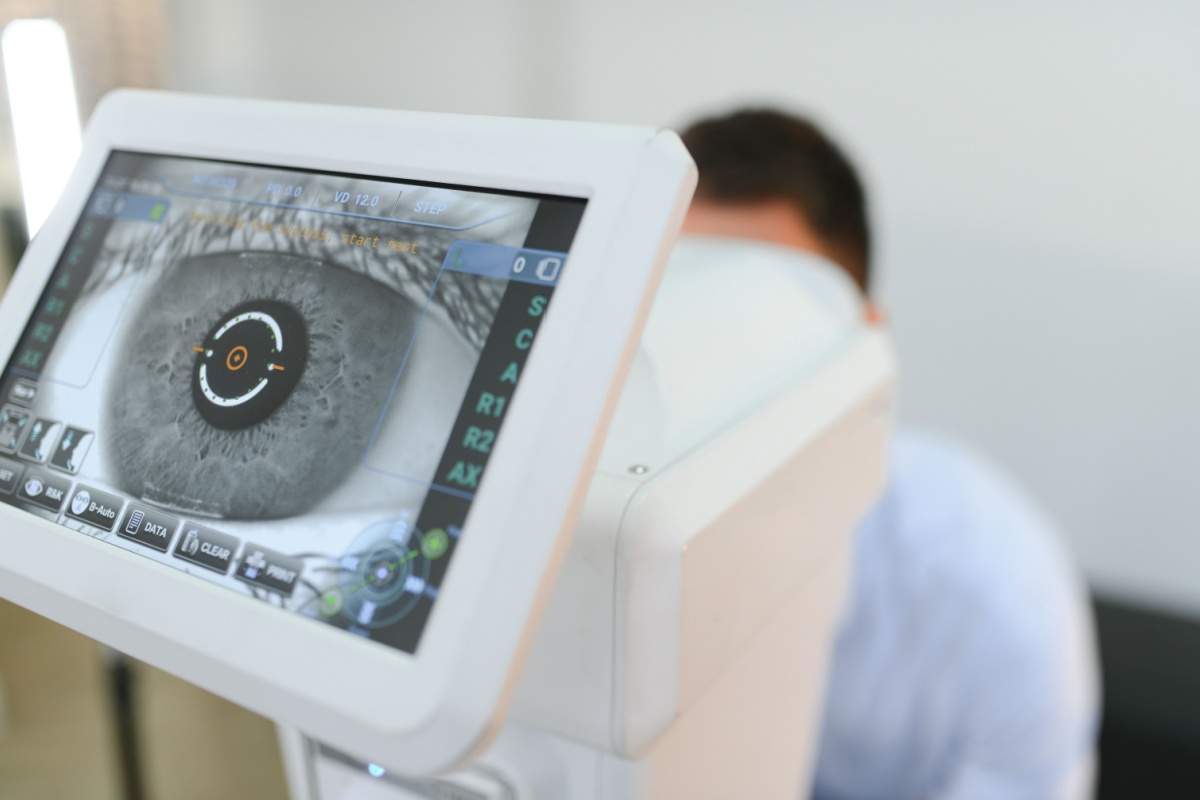
Your eyes can reveal far more than vision changes. During a comprehensive eye exam, your optometrist can detect early signs of serious health conditions—often before symptoms appear elsewhere in the body. At Brantford Eye Care, advanced diagnostic technology allows us to assess both your vision and your overall health in a single, thorough examination. A […]
Chalazion & Dry Eye: How Jett Plasma Pen Can Help
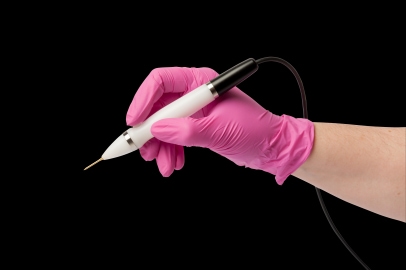
An unexpected bump on your eyelid can be concerning. It might feel a little tender or just be an annoyance you notice when you look in the mirror. This common issue, called a chalazion, is often connected to the overall health and function of your eyelids and may be related to conditions like dry eye […]
Why Buy Eyeglasses From Your Optometrist?

Ordering glasses online might seem convenient, but when it comes to your vision, convenience isn’t always the best choice. From blurry lenses to uncomfortable frames, many people find themselves disappointed after clicking “Buy Now.” Buying from your optometrist offers the accuracy, quality, and support that a website can’t replicate. Rather than taking a gamble with […]

Our Brands




Check Us Out On Instagram

See Our Google Reviews




